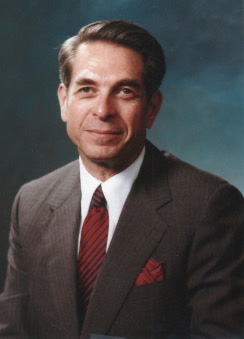Updated: Sept. 10, 2018 at 9:46 p.m.
Sheldon Cohen, a triple alumnus, emeritus professor and chair emeritus of the Board of Trustees, died Tuesday at 91.
Cohen died of complications from congestive heart failure. Cohen, who grew up in the District, shaped the field of tax law and cared about bettering the world, former colleagues and family members said.

Courtesy of the Cohen Family
Sheldon Cohen received associate’s, bachelor’s and law degrees from GW in the 1950s and served on the Board of Trustees for 22 years.
Cohen received associate’s, bachelor’s and law degrees from GW in the 1950s and served on the Board of Trustees for 22 years – including as chair from 2000 to 2001. He received an honorary doctorate of law from GW in 2003 and served as an adjunct law professor.
Laura Apelbaum, Cohen’s daughter, said her father was honest, humorous and had a “high level of integrity.”
She said she and her siblings have fond memories of their father handing them their diplomas when graduating from GW – whether that be from the law school or graduate school.
“He was really devoted to GW,” she said.
She said her father would take his children to GW basketball games or the president’s dinner during former University President Stephen Joel Trachtenberg’s tenure. She and her siblings remember Cohen taking them to the Smithsonian museums or making breakfast for dinner when their father wasn’t working.
“He was always there to offer a word of encouragement or advice, even though he was very busy,” she said. “He had a good work-life balance – that was very important about him.”
She added that he will be remembered as being one of the “most influential authorities on shaping tax policy.” Cohen was appointed as the commissioner of the Internal Revenue Service in 1965, at a time when the tax agency was just starting to use computers to process tax returns.
Cohen helped achieve full computerization of the agency and also helped set up the first presidential blind trust – a financial arrangement intended to prevent conflicts of interest for a public officeholder – for Lyndon B. Johnson.
“He is held in very high esteem in the world of tax policy and ethics,” Apelbaum said.
Cohen spent many years of his life helping secular and Jewish organizations and served as an honorary life trustee of the American Jewish Historical Society, she added.
Jonathan Turley, a professor of public interest law and director of the Environmental Law Advocacy Center, said Cohen’s work establishing the first presidential blind trust was “the gold standard for ethics in its day” and had a deep and lasting legacy on the nation.
“Sheldon Cohen should be a lesson to every student that a life is measured ultimately by what you leave behind: the people you have helped, the causes you supported, the difference that you made,” he said.
Nelson Carbonell, the chair of the Board of Trustees, said Cohen showed a “deep commitment” to GW through his service to the University.
“Not only did he return to his alma mater to teach, he also spent 22 years guiding the University as a trustee during a transformative period in GW’s history,” Carbonell said. “He will be greatly missed by the GW community.”
Neil Buchanan, a professor at the law school, said Cohen “peaked early and didn’t fade.” Cohen was appointed as IRS commissioner when he was in his mid-30s.
“There are people who don’t achieve that in 90 years, and he achieved it before his 40th birthday,” he said.
Buchanan described Cohen as a “happy conversationalist” and said he often told anecdotes from his career, like receiving a call from the White House or discussing Jackie Kennedy’s tax issues.
Karen Brown, a professor of business law, described Cohen as an “accomplished teacher” who cared deeply about his law students.
Brown said the culture at the law school – one that expects its students to graduate and become public servants – shaped Cohen.
“I think our students leave feeling like they have graduated in order to give back to the community at large,” she said. “He exemplified that to the highest degree.”
As tax commissioner, Cohen advocated for a system where the Americans living in poverty would not only pay no taxes, but instead receive money from the government – the precursor to the federal Earned Income Tax Credit, Brown said.
“He really cared about thinking about people who can’t really fend for themselves,” she said. “Caring and taking the extra step to make a difference in the lives of students and the greater society.”
Cohen is survived by four children – Melinda Goetzl, Laura Apelbaum, Johnathan Cohen and Sharon Liebman – and 10 grandchildren. He is also survived by his brother Gerald Cohen and sister Barbara Wolf. His wife, Faye Fram, died in April after 67 years of marriage.
Leah Potter and Meredith Roaten contributed reporting.
This post was updated to reflect the following correction:
The Hatchet incorrectly reported the year of Cohen’s appointment as IRS commissioner. The year is now correct. We regret this error.




